Understanding the Connection Between Diet and Recovery
Recovering from alcohol addiction isn’t just a mental and emotional journey—it’s a physical one, too. The body undergoes significant changes during and after alcohol use, making proper nutrition a cornerstone of effective recovery. This article delves into the foods and nutrients that play pivotal roles in helping individuals rebuild their health and maintain sobriety.
Nutritional Fundamentals for Recovering Alcoholics
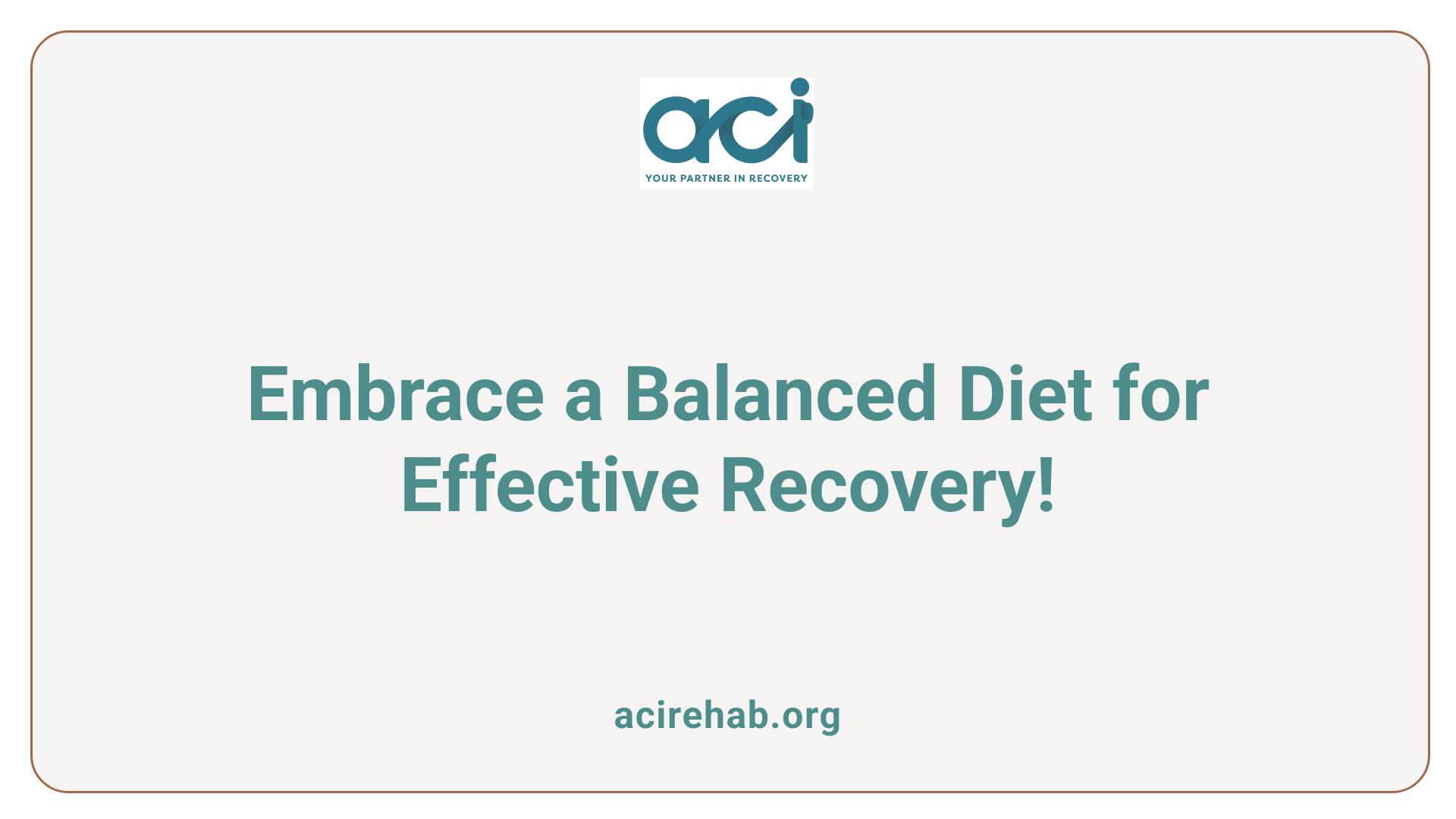
What is the nutritional guidance for individuals recovering from alcohol addiction?
Nutritional guidance for those recovering from alcohol addiction focuses on restoring depleted nutrients and supporting mental health. It emphasizes the importance of a balanced diet that includes complex carbohydrates, healthy fats, and adequate protein for physical repair and overall well-being.
A well-rounded diet should consist of:
- Complex Carbohydrates: Incorporate fruits, vegetables, whole grains, and beans to stabilize blood sugar and reduce cravings.
- Healthy Fats: Omega-3 and monounsaturated fats from sources like fatty fish, avocados, and nuts are vital for nutrient replenishment.
- Adequate Protein: Proteins from nuts, eggs, and lean meats help repair tissue damage and improve recovery outcomes.
Hydration is also crucial; recovering individuals should aim for about eight glasses of water a day, as dehydration can be a concern during recovery. Nutrient-rich liquids such as soups and smoothies can provide essential hydration and are often easier to digest.
Supplementing the diet with vitamins and minerals is vital to combat deficiencies often seen in alcohol misuse. Common deficiencies include vitamins B1, B6, and folate, which can be replenished through proper dietary choices and targeted supplements.
Importance of a balanced diet
A balanced diet is fundamental in recovery. It is typically recommended to obtain approximately 45% of calories from carbohydrates, 30% from healthy fats, and 25% from protein. This balance helps stabilize energy levels, manage cravings, and support brain function.
Impact of malnutrition due to alcohol
Chronic alcohol use leads to significant nutritional deficiencies, disrupting absorption and utilization of essential nutrients. This can manifest as low vitamin levels and minerals, such as calcium, iron, and zinc. Malnutrition exacerbates health issues, complicating the recovery process. Therefore, tailored nutritional plans developed with professional help can greatly enhance recovery outcomes by addressing specific needs and promoting overall health.
Foods for Recovery Success
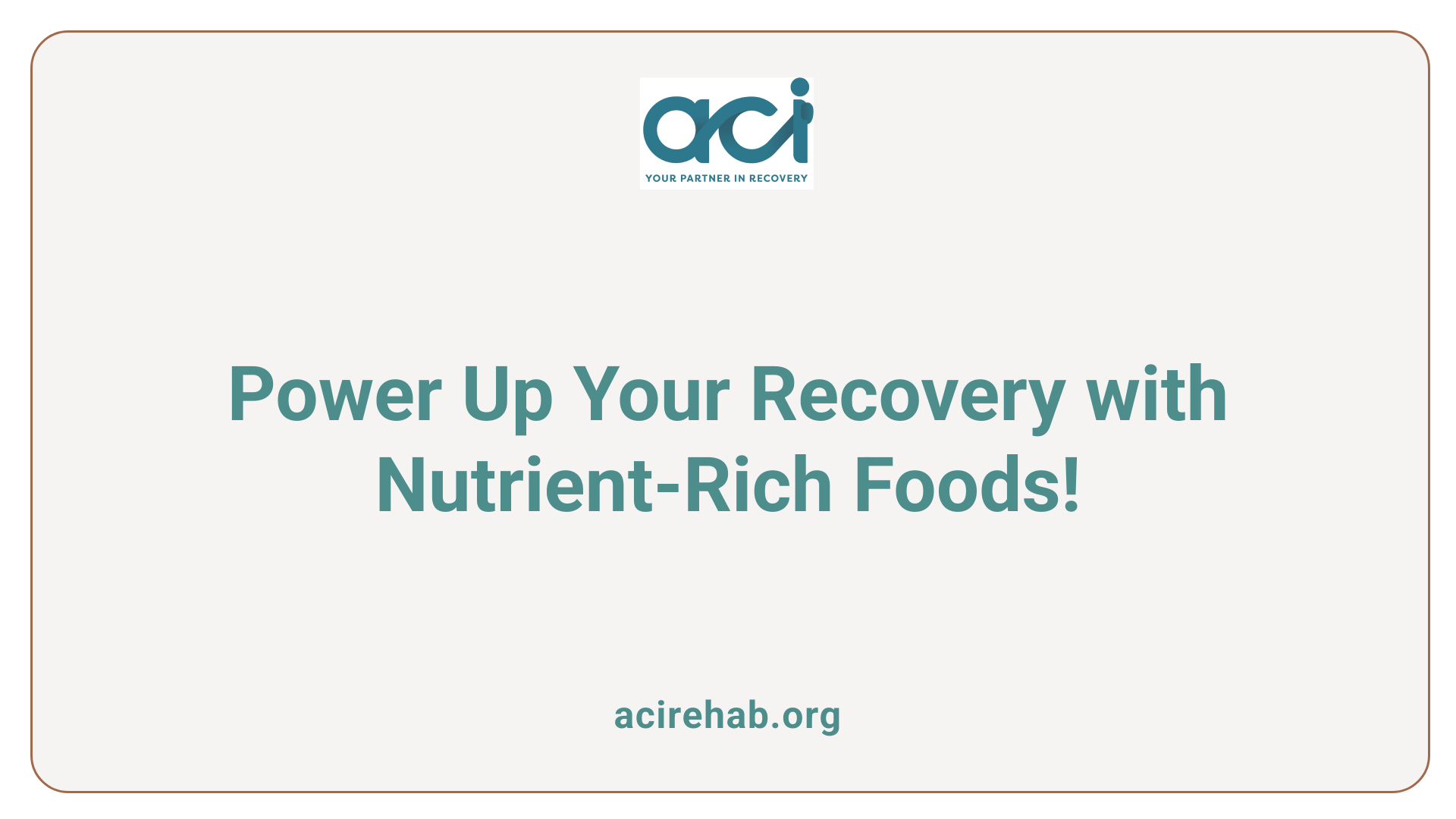
What specific foods aid in the recovery process from alcohol use disorder?
The recovery process from alcohol use disorder greatly benefits from a selection of nutrient-rich foods. It’s important to focus on complex carbohydrates, healthy fats, and protein sources to promote better health and healing.
Foods Rich in Vitamins and Minerals
Nutritional deficiencies are common in those recovering from alcohol use. Incorporating foods like:
- Leafy greens (e.g., spinach, kale)
- Fruits (e.g., berries, oranges)
- Nuts and seeds (e.g., sunflower seeds)
- Lean proteins (e.g., chicken, fish)
- Whole grains (e.g., quinoa, brown rice)
These foods are rich in B vitamins, vitamin A, vitamin C, and essential minerals like calcium and zinc, addressing deficiencies and bolstering the immune system.
Sources of Complex Carbohydrates
Complex carbohydrates are crucial as they provide a steady release of energy and help maintain balanced blood sugar levels. Good options include:
- Whole grains such as oats and brown rice
- Legumes like beans and lentils
- Fruits and vegetables which not only add fiber but also essential vitamins.
These foods can help reduce cravings and regulate mood, making them vital during recovery.
Role of Healthy Fats and Proteins
Healthy fats contribute significantly to brain health and emotional well-being. Foods rich in omega-3 fatty acids, like:
- Fatty fish (e.g., salmon, mackerel)
- Avocados
- Nuts (e.g., walnuts)
These help reduce inflammation. Meanwhile, protein sources like eggs, tofu, and lean meats are crucial for repairing tissue damage and stabilizing energy levels, aiding in the overall recovery process.
By integrating these food groups into a balanced diet, individuals in recovery can take significant steps towards improving their physical and mental health.
The Impact of Alcohol on Nutritional Health
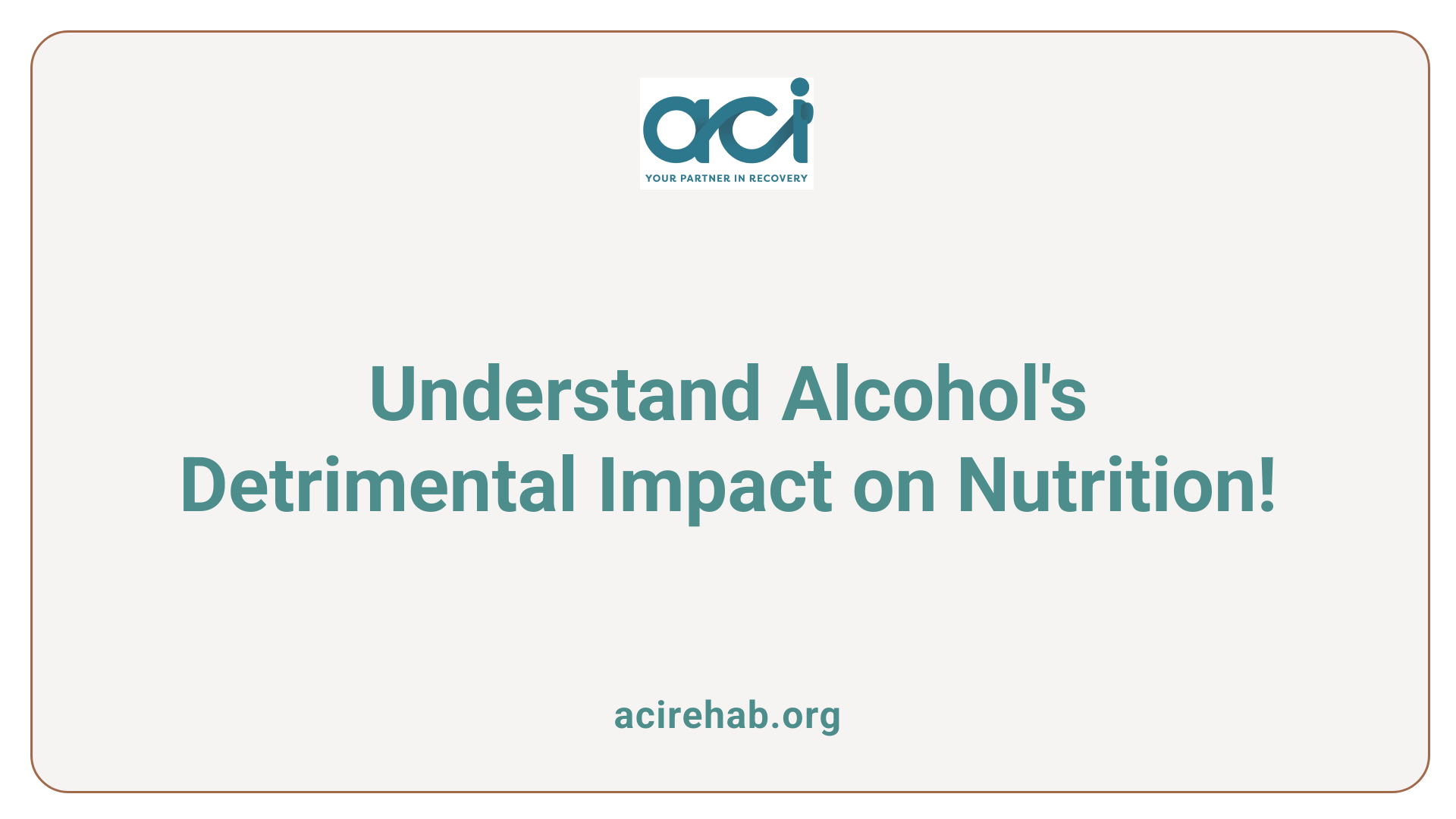
How does alcohol impact nutrition and dietary health?
Alcohol impacts nutrition and dietary health in several detrimental ways. Chronic consumption interferes with the absorption of essential nutrients such as thiamin, vitamin B12, folic acid, and zinc, which are crucial for energy metabolism and overall health. This disruption can lead to a wide range of nutrient deficiencies, impacting physical and neurological health.
Moreover, alcohol provides ’empty calories’ that do not offer nutritional benefits, contributing to malnutrition and increasing the risk of various health issues. For individuals struggling with alcohol use disorder, poor dietary choices often ensue, emphasizing unhealthy foods high in sugar and unhealthy fats.
What are common nutrient deficiencies in alcoholics?
Common nutrient deficiencies in individuals with alcohol use disorder include:
- Vitamin B1 (thiamine): Essential for brain function; deficiencies can lead to cognitive issues.
- Folic Acid (Vitamin B9): Important for preventing anemia and stabilizing mood.
- Vitamin B6: Helps in mood regulation; a deficiency can heighten cravings.
- Calcium, Iron, Magnesium, and Zinc: Vital minerals that often become depleted.
What are the health ramifications of chronic alcohol use?
The health ramifications of chronic alcohol use can be severe, leading to conditions such as:
- Liver Disease: It significantly impacts liver function.
- Nutritional Deficiencies: These can cause symptoms ranging from fatigue to severe cognitive decline.
- Impaired Immune Function: Nutrient depletion disrupts immune responses, increasing susceptibility to infections.
Overall, the combination of nutrient deficiencies and chronic alcohol use has a significant negative impact on overall health and recovery, emphasizing the importance of proper nutrition in rehabilitation programs.
Dietary Recommendations for Easing Withdrawal
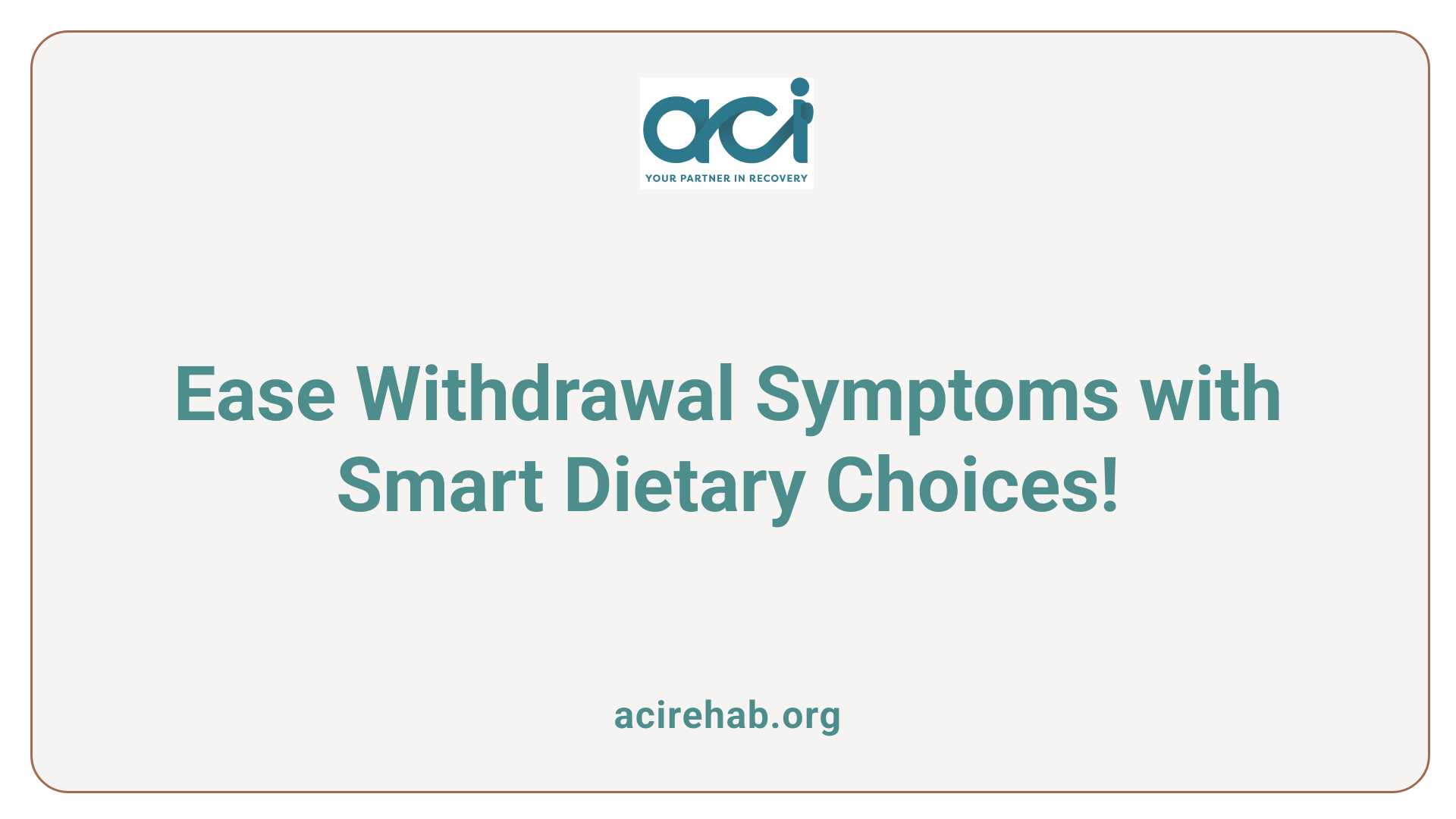
What dietary recommendations are there to alleviate withdrawal symptoms and cravings?
To alleviate withdrawal symptoms and cravings, a nutrient-rich diet is essential, particularly during alcohol detoxification. Focus on a balanced intake of complex carbohydrates, lean proteins, and healthy fats. Whole grains like quinoa and oats can help stabilize blood sugar, reducing irritability and anxiety.
Incorporate plenty of fruits and vegetables, such as berries and dark leafy greens, which provide vital vitamins, minerals, and hydration. Foods rich in omega-3 fatty acids, like fatty fish and walnuts, support brain health and mood stabilization.
Foods for managing cravings
To effectively manage cravings, consider including:
- Dark Chocolate: Contains antioxidants and magnesium, possibly reducing cravings
- Lean Proteins: Such as chicken, fish, or legumes, help stabilize energy levels
- Nuts and Seeds: Packed with healthy fats and proteins, ideal for snacking
- Spicy Foods: Can distract from cravings and elevate mood due to endorphin release
Nutrient timing and balance
Aim for meals composed of approximately 45% carbohydrates, 30% healthy fats, and 25% protein to ensure energy is sustained throughout the day. This balance can help manage cravings effectively.
Specific foods to avoid
Avoid processed foods, excess sugar, and caffeine during recovery. These can trigger cravings and lead to energy spikes followed by crashes, exacerbating feelings of fatigue and mood swings.
The Role of Vitamins and Meal Planning
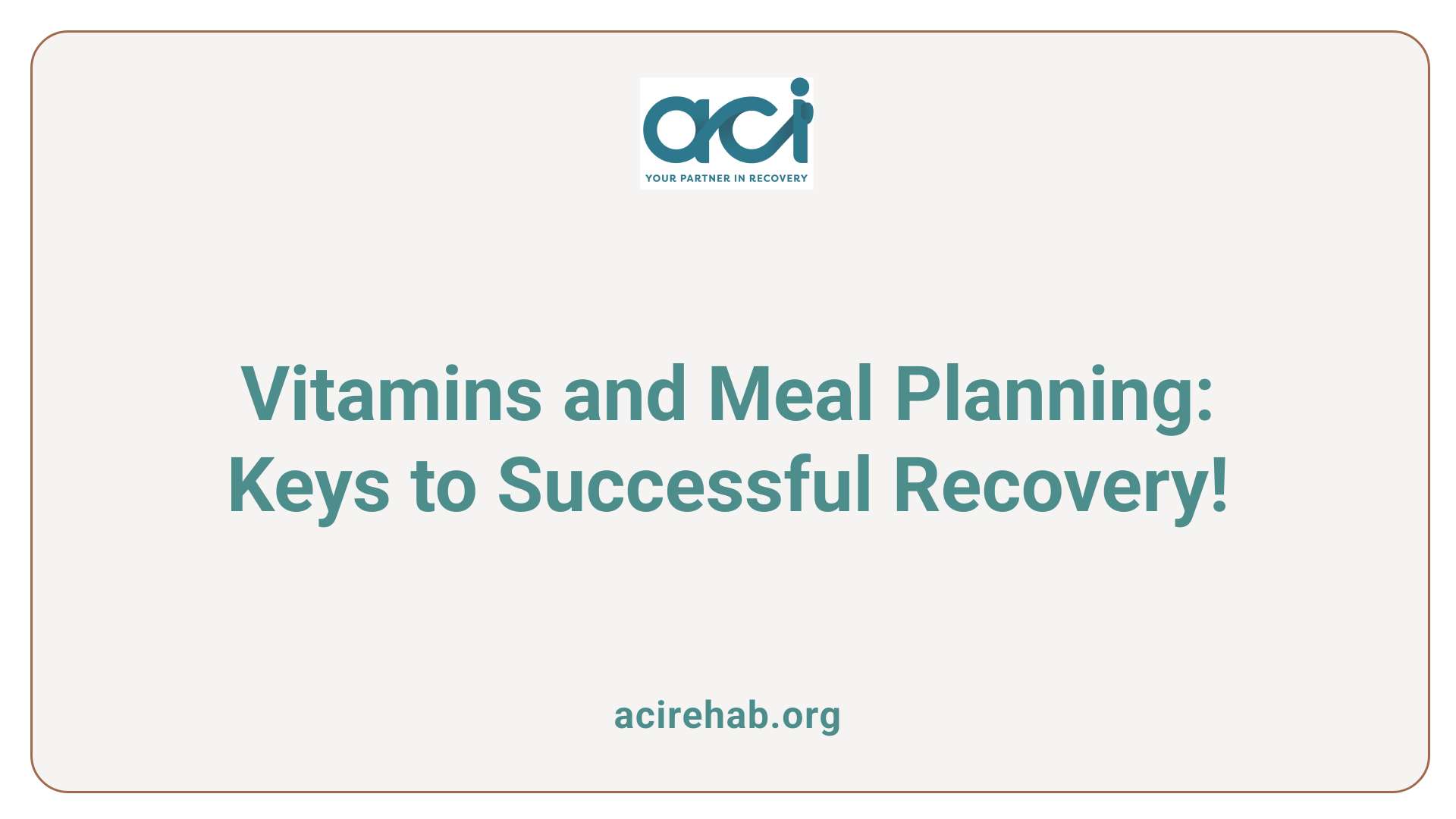
What is the role of vitamins and meal planning in supporting recovery from alcohol addiction?
Vitamins and meal planning play an essential role in supporting recovery from alcohol addiction. Individuals recovering often experience deficiencies in crucial nutrients like B vitamins, vitamin D, calcium, and magnesium due to the detrimental effects of alcohol on absorption and metabolism. Addressing these deficiencies is vital for repairing physical and mental damage caused by substance abuse.
Key vitamins for recovery
Several vitamins are particularly important during recovery:
- Vitamin B1 (Thiamine): Supports cognitive function and energy metabolism.
- Vitamin B6: Helps regulate mood and prevent anemia. Foods include poultry and fish.
- Vitamin B9 (Folate): Important for red blood cell formation and stabilizing mood, found in enriched grains and leafy greens.
- Vitamins A, C, D, E, and K: Essential for immune system support and overall health.
Importance of structured meal planning
A structured meal plan can aid health recovery by promoting a balanced intake. A recommended macronutrient distribution consists of roughly 50% complex carbohydrates, 20-30% healthy fats, and 20-25% protein. This balance helps stabilize blood sugar levels, reduce cravings, and support brain health. Nutrient-dense foods, such as:
- Fruits and Vegetables: For vitamins and fiber, aiding detoxification.
- Whole Grains: Like quinoa and brown rice for sustained energy.
- Lean Proteins: Such as eggs and legumes for tissue repair and muscle health.
Dietary supplements
In addition to whole foods, dietary supplements may be beneficial during recovery. These could include B-complex vitamins, zinc, magnesium, and vitamin C to further enhance recovery efforts. Always consult a healthcare professional before starting any supplementation to tailor the approach to individual needs.
In summary, proper nutrition, focusing on vitamins and strategic meal planning, supports the recovery journey significantly by replenishing lost nutrients and enhancing overall health.
Hydration and Nutrient Intake Strategies
Importance of Regular Hydration
Staying adequately hydrated is essential during recovery from alcohol addiction. Alcohol consumption often leads to dehydration due to its diuretic effects, causing symptoms like fatigue and headaches. Proper hydration not only supports detoxification but also aids in maintaining optimal organ function, which is critical given that the liver and pancreas are often compromised by excessive drinking.
Electrolyte Restoration
Restoring electrolytes is a vital component of recovery nutrition. Essential minerals such as calcium, magnesium, and zinc can be depleted by chronic alcohol use. Foods that are rich in electrolytes, like yogurt, avocados, and watermelon, help replenish these minerals and can alleviate some withdrawal symptoms. Incorporating nutrient-rich liquids like broths and smoothies can further bolster hydration and provide needed nutrients in an easily digestible form.
Nutrient-Dense Liquid Options
In addition to solid food, incorporating nutrient-dense liquids can significantly aid recovery. Opting for soups, smoothies, and electrolyte-infused waters can provide hydration while delivering essential vitamins and minerals. For instance, smoothies made with leafy greens, fruits, and nut butter not only taste good but also supply vital nutrients that combat cravings and stabilize mood.
A focus on both hydration and nutrient intake during recovery reinforces overall health and supports the brain’s recovery processes. By breaking the cycle of nutrient depletion and dehydration, individuals can pave the way for a more successful recovery from alcohol addiction.
Influence of Diet on Mental and Physical Health
How do dietary choices influence physical and mental health during recovery from alcohol addiction?
Dietary choices play a crucial role in both physical and mental health during recovery from alcohol addiction. A nutritious diet can enhance mood, energy levels, and cognitive function, which are essential for combating the psychological challenges of recovery.
Nutritional deficiencies, particularly in B vitamins, can lead to complications such as anemia and neurological issues, negatively impacting mental health. For instance, low levels of vitamin B1 can impair brain function, heightening cravings.
In contrast, a well-rounded intake of foods rich in complex carbohydrates, healthy fats, and proteins supports the body’s healing processes. Foods like whole grains, fatty fish, nuts, and colorful fruits stabilize blood sugar levels and improve energy, helping to manage withdrawal symptoms effectively. The gut microbiome, influenced by dietary habits, is also important; a healthy microbiome is linked to mood regulation through the gut-brain axis.
Nutritional support for mental well-being
Proper nutrition can enhance psychological resilience in recovery. Foods high in omega-3 fatty acids, such as fatty fish and walnuts, have shown promise in stabilizing mood and reducing cravings. Antioxidant-rich fruits and vegetables support brain health, alleviating physiological imbalances that can lead to heightened anxiety or depression.
Physical health improvements
From a physical health standpoint, a balanced diet fills nutrient gaps, replenishing essential vitamins and minerals that often suffer due to alcohol misuse, such as calcium and magnesium. Maintaining regular meal times and focusing on whole, unprocessed foods can prevent further deficiencies and support overall healing, reducing the risk of relapse by fostering both physical strength and emotional stability.
Foods and Habits to Avoid During Recovery
What foods and substances should recovering alcoholics avoid to support their recovery?
During recovery, it’s crucial to steer clear of certain foods and substances that can hinder progress. Sugar-heavy snacks and caffeinated beverages can exacerbate mood swings and cravings due to blood sugar spikes and crashes.
Impact of unhealthy snacks
Highly processed and fast foods are often low in essential nutrients and high in sodium and unhealthy fats. These options can impede the body’s recovery and lead to nutritional deficiencies, impacting both physical and mental health.
Role of sugar and caffeine
Sugary foods can cause quick energy surges followed by crashes, worsening feelings of fatigue and increasing vulnerability to cravings. Similarly, caffeine can stir anxiety and disrupt sleep patterns, both of which are critical during recovery.
Better alternatives and choices
Instead, opting for whole, nutrient-rich foods like fruits, vegetables, lean proteins, and whole grains ensures stable energy levels, mood enhancement, and better physiological support for recovery. Regular meals with balanced nutrients, including fiber and complex carbohydrates, can greatly assist in maintaining mental and physical well-being during this challenging time.
Meal Planning Tips for Sustainable Recovery
Structure and routine in meals
Creating a consistent meal schedule can greatly benefit recovery from alcohol use. Regular meal times help stabilize blood sugar levels and prevent cravings. Aim for three main meals with healthy snacks in between to maintain energy levels throughout the day.
Incorporating variety and balance
A balanced diet is essential during recovery. Include diverse foods from all food groups:
- Complex Carbohydrates: Whole grains like brown rice, quinoa, and oats.
- Healthy Fats: Include omega-3s from fatty fish and monounsaturated fats from nuts and avocados.
- Proteins: Opt for lean meats, legumes, and low-fat dairy.
Adding vibrant fruits and vegetables not only enhances meal enjoyment but also provides necessary vitamins and minerals, pivotal for recovery.
Practical advice for busy lifestyles
For those with hectic schedules, meal prepping can be a lifesaver. Prepare meals in advance and store them in the refrigerator or freezer for easy access. Consider nutrient-rich smoothies packed with fruits, greens, and protein powder for quick breakfast options. When snacking, choose wholesome options like nuts, seeds, or vegetable sticks to manage cravings effectively, ensuring that recovery remains a priority in daily life.
Crafting a Path to Sobriety Through Nutrition
For individuals recovering from alcohol addiction, maintaining a nutritious diet is a crucial component of the healing journey. By focusing on balanced meals filled with vitamins, minerals, and hydration, the body can repair itself from alcohol-induced damage. Through informed dietary choices, one not only supports physical recovery but also fosters mental resilience, paving the way to a healthier, sober life.
References
- Diet for Alcohol Recovery
- Alcohol Use Disorder: Nutrition During Recovery
- The Best Foods For Alcohol Detox And Addiction recovery
- 10 Best Foods To Eat During an Alcohol Detox
- Nutrition and Diet in Alcohol Recovery
- 7 Foods That Can Help Stop Alcohol Cravings
- How to Detox From Alcohol (With Food)
- What are the Best Alcohol Detox Foods in 2023 & 2024
- Substance use recovery and diet
- Diet for Alcohol Recovery

